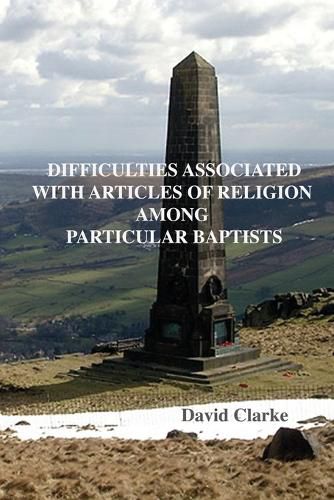Readings Newsletter
Become a Readings Member to make your shopping experience even easier.
Sign in or sign up for free!
You’re not far away from qualifying for FREE standard shipping within Australia
You’ve qualified for FREE standard shipping within Australia
The cart is loading…






This title is printed to order. This book may have been self-published. If so, we cannot guarantee the quality of the content. In the main most books will have gone through the editing process however some may not. We therefore suggest that you be aware of this before ordering this book. If in doubt check either the author or publisher’s details as we are unable to accept any returns unless they are faulty. Please contact us if you have any questions.
Articles of religion or confessions of faith are used to inform others of what a person, a church or society believe with respect to religious beliefs. Some churches restrict membership to those who will subscribe to their articles of religion. One of the problems that this brings is that there comes a time when a new believer cannot, in conscience, subscribe to a tenet of belief that they do not understand. It may be the article is badly worded or poorly written, or may in fact be in error. In which case, a new believer could not in conscience subscribe to something they do not understand. This did not happen in the early days of the Christian church, as there was Apostolic authority to settle matters of religious differences. Those whom the Lord added to the church were such as should be saved, and they did not have to subscribed to a written confession of faith like those we are about to look at in a moment. Even the Apostles were growing in knowledge of the Lord Jesus Christ, just as we do today. Peter is an example of an Apostle was in error whom Paul had to withstand to the face, over matters of doctrine and practice. 1 Galatians 2.7.
$9.00 standard shipping within Australia
FREE standard shipping within Australia for orders over $100.00
Express & International shipping calculated at checkout
Stock availability can be subject to change without notice. We recommend calling the shop or contacting our online team to check availability of low stock items. Please see our Shopping Online page for more details.
This title is printed to order. This book may have been self-published. If so, we cannot guarantee the quality of the content. In the main most books will have gone through the editing process however some may not. We therefore suggest that you be aware of this before ordering this book. If in doubt check either the author or publisher’s details as we are unable to accept any returns unless they are faulty. Please contact us if you have any questions.
Articles of religion or confessions of faith are used to inform others of what a person, a church or society believe with respect to religious beliefs. Some churches restrict membership to those who will subscribe to their articles of religion. One of the problems that this brings is that there comes a time when a new believer cannot, in conscience, subscribe to a tenet of belief that they do not understand. It may be the article is badly worded or poorly written, or may in fact be in error. In which case, a new believer could not in conscience subscribe to something they do not understand. This did not happen in the early days of the Christian church, as there was Apostolic authority to settle matters of religious differences. Those whom the Lord added to the church were such as should be saved, and they did not have to subscribed to a written confession of faith like those we are about to look at in a moment. Even the Apostles were growing in knowledge of the Lord Jesus Christ, just as we do today. Peter is an example of an Apostle was in error whom Paul had to withstand to the face, over matters of doctrine and practice. 1 Galatians 2.7.